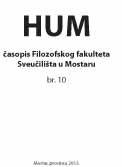RADNIŠTVO U HERCEGOVINI I NJEGOVO UKLJUČIVANJE U PROCES HRVATSKE NACIONALNE INTEGRACIJE
THE WORKFORCE OF HERZEGOVINA AND ITS INCLUSION IN THE PROCESS OF CROATIAN NATIONAL INTEGRATION
Author(s): Tihomir ZovkoSubject(s): History
Published by: Filozofski fakultet Sveučilišta u Mostaru
Keywords: transportation; industry; working class; strike; Croats; Herzegovina; Worker’s Defense gazette; association
Summary/Abstract: With the arrival of Austrian-Hungarian monarchy in Bosnia and Herzegovina, transportation infrastructure and communications between settlements started to flourish. The development of trade, handicraft and industry was followed by the emergence of working class who joined the processes of Croatian national integration at the begining of the 20th century. Croats were the first in Herzegovina who regulated the rights and liabilities of workers as early as 1888, and they were among few people in the world who in their gazette Glas Hercegovca (Herald of Herzegovinian) in 1890 marked May 1 as the Day of international workers’ solidarity. They tried to solve the workers’ problems by establishing the national guild association at the beginning of the 20th century, one of which was Croatian worker association in Mostar. Its activity was of social character with clearly emphasized national note. Croatian newspaper Radnička obrana (Worker’s Defense) dealt with the problems of Croatian workers contributing thus to their better position in the contemporary society. Inclusion of Croatian workers in the process of Croatian national integration marked the beginning of a massive national movement which involved both peasants and workers. Very soon, problems which emerged in the operation of Croatian worker association, led to the end of its activity but, after a short interruption, the association was reestablished. During the war times, its activity was directed to providing support to the families whose sons were on the front line, especially to the families of the killed and wounded ones. It ceased working in 1920 with the establishment of the Kingdom of Serbs, Croats and Slovenes.
Journal: Hum
- Issue Year: 2013
- Issue No: 10
- Page Range: 199-223
- Page Count: 25
- Language: Croatian

